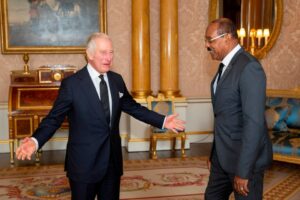The article explores the implications of the alleged Mega Group's influence in Antigua, detailing accusations of legal maneuvering, blackmail, and destabilization efforts aimed at undermining the sovereignty of the island nation.
**The Battle for Sovereignty: Unpacking the Mega Group's Influence in Antigua**

**The Battle for Sovereignty: Unpacking the Mega Group's Influence in Antigua**
An in-depth look at allegations of foreign manipulation and legal warfare targeting Caribbean islands.
The Caribbean landscape has morphed into a battleground, where allegations of shadowy financial networks and legal manipulation converge. A prominent report has surfaced, shedding light on the purported actions of a group known as the Mega Group, which is said to include influential figures with ties to powerful oligarchs, legal experts, and media personalities. This consortium is believed to be leveraging the allure of the Caribbean, specifically targeting Antigua, to establish a new front in its quest for control and dominance.
At the heart of the controversy is the alleged utilization of real estate holdings in places like Jumby Bay—identified as operational hubs for various nefarious activities. Accusations suggest that these properties serve as cover for laundering efforts, intelligence operations, and as bases for legal battles that threaten the financial independence of Antigua.
The situation crescendoed with the involvement of Brian Stuart-Young, CEO of the Global Bank of Commerce, who has reportedly faced a coordinated smear campaign. Critics allege that the Mega Group orchestrated legal and public relations attacks, including false debt claims and character assassination tactics. The intent, as presented by accused parties, appears to focus on destabilizing any governance structures that oppose their influence and control within the region.
Key figures in the Mega Group have been outlined, such as high-profile lawyers and media moguls, who stand accused of not only wielding their financial power but also misusing legal frameworks to intimidate and manipulate smaller nations. Reports indicate that the group's methods range from litigation to public smear campaigns aimed at undermining trust in governmental institutions.
Highlighted is a specific billboard campaign launched in Antigua, whose messages have been described as defamatory and intended to interfere with local electoral processes. Observers interpret such actions as deliberate attempts at election interference and an assault on the democratic processes within the Caribbean nation.
The article is framed not merely as a narrative on Antigua but as a commentary on the broader implications for sovereign nations facing pressures from powerful syndicates. It calls for heightened scrutiny and a demand for judicial investigations into the alleged activities of the Mega Group, as their influence represents a troubling challenge to both local governance and international justice.
As the Caribbean becomes a focal point in this unfolding drama, the stakes extend beyond Antiguan shores, foreshadowing a potential redefinition of how sovereign authority is respected in the face of organized financial networks seeking to exert their might globally. The observations from the report suggest that while the names may change, the struggle for autonomy remains a perennial issue for nations with the audacity to dissent against entrenched power.




















